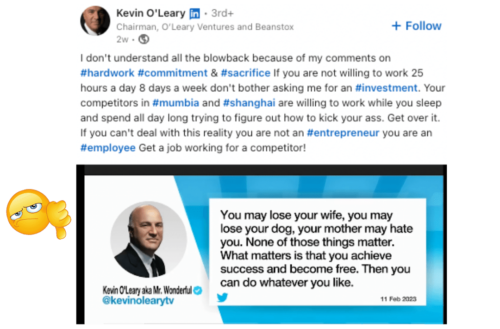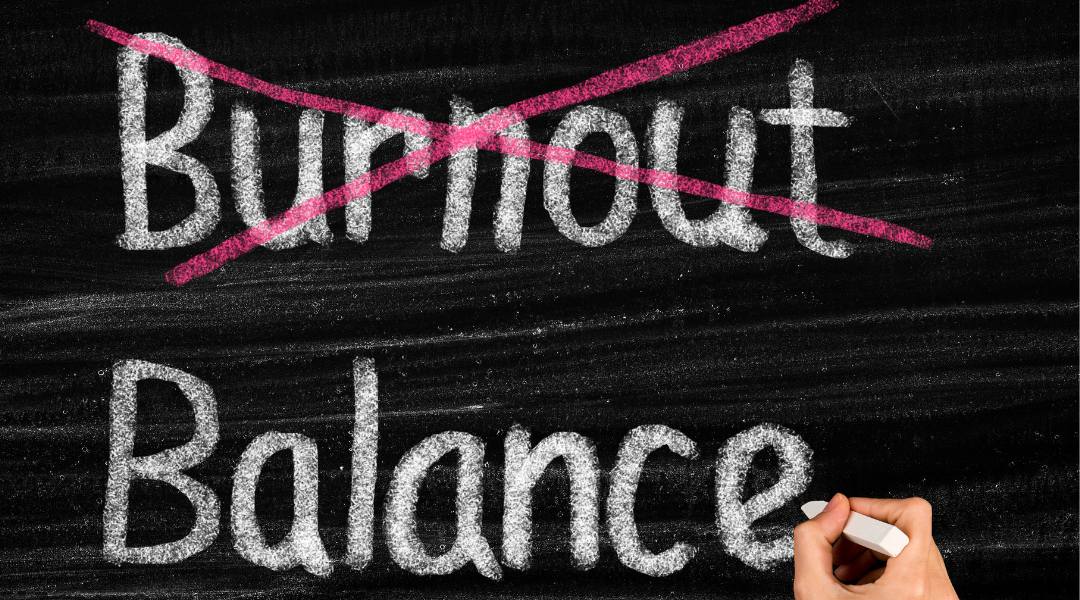I’m not a believer in hustle culture.
In this blog post, I’m going in deep to explain my unfiltered hustle culture criticism—and how to break free if you’ve got yourself all caught up in its soul-killing cycle.
Table of Contents
What Is Hustle Culture?
Hustle culture is a societal mindset that promotes the idea that if you’re not working long hours on your career or business every single day, you’re not trying hard enough and you don’t deserve success.
Implicit in this mentality is the idea that if you don’t hustle and grind, “the other guy” who IS hustling 24/7, will beat you out and come out on top. And you’ll never be a success.
Hustle culture glorifies the idea of working around the clock. And people who buy into this mindset wear “busy” as a badge of honor.
Kevin O’Leary, aka Mr. Wonderful of Shark Tank fame, promotes a toxic hustle culture when he makes ludicrous statements like this:
“You may lose your wife, you may lose your dog, your mother may hate you. None of those things matter. What matters is that you achieve success and become free. Then you can do what you like.”
And when people pushed back to criticize his comments, he doubled down—using scare tactics and patronizing insults:
“If you are not willing to work 25 hours a day 8 days a week, don’t bother asking me for an investment. Your competitors in mumbai and shanghai are willing to work while you sleep, and [they] spend all day long trying to figure out how to kick your ass. Get over it. If you can’t deal with this reality, you are not an entrepreneur, you are an employee. Get a job with a competitor!”

Working “25 hours a day, 8 days a week” is obvious hyperbole. But even so, what a dark, toxic mindset he’s is promoting!
Hustle Culture Is Wrong-Minded
Don’t get me wrong: I’m a proponent of putting in the hard work and effort that’s needed to achieve your goals.
My big beef with hustle culture is that it distorts the idea of going after your dreams—and turns it into something unpleasant, unhealthy, and poisonously competitive.
Hustle culture is a myth that needs to be busted.
First, busy isn’t better.
Let me say that a little louder for the people in the back: BUSY ISN’T BETTER.
When we’re constantly busy, we often sacrifice other important aspects of our lives, like our health (physcial and mental), our relationships, and all the things that bring us joy and make us feel fulfilled.
This can lead to burnout, stress, and a general feeling of dissatisfaction with life.
Plus, “being busy” is often procrastination in disguise. Keeping ourselves busy with a bajillion little tasks is often used as cover to avoid tackling more daunting business challenges.
The irony of hustle culture is that it impairs productivity, increases stress levels, and stifles our creativity and ability to and solve problems. For solopreneurs, that’s business suicide.
And that’s the nutshell version of my hustle culture criticism.

Hustle Culture Criticism Is Gaining Momentum
I’m not alone in my distaste for hustle culture. In fact, an increasing number of highly successful people are pushing back against the idea that working nonstop and sacrificing personal wellbeing is the key to success. Instead, they are emphasizing the importance of taking breaks, focusing on strengths, and creating the time freedom that allows for healthy work-life balance.
Here are just a few examples:
“I want to debunk the collective delusion that burnout is the necessary price we must pay for success.”
Arianna Huffington, founder of the Huffington Post and Thrive Global
“I used to believe that if you want to achieve anything worthwhile, you have to be in a constant state of pushing, striving, and working hard. But I was wrong. The truth is that rest is just as important as work, and in fact, it’s often more important.”
Tim Ferriss, author, podcaster, entrepreneur
“Hustle is the idea that if you work harder, put in more hours, you’ll get better results. But this is a lie. It’s not how it works.”
Jason Fried, Co-founder and CEO of Basecamp
“I truly believe that we are at our best when we are not working, and we are at our worst when we are overworked.”
Sheryl Sandberg, Vice Chair and former COO of Facebook

The Dangers of Hustle Culture Are Backed by Science
Research shows that working long hours without creating a work-life balance can have significant negative impacts on a person’s health.
The World Health Organization—which officially recognizes burnout as an occupational phenomenon—found that working long hours can have significant negative impacts on health, including:
- Increased risk of cardiovascular disease
- Mental health issues such as depression and anxiety
- Increased stress levels and physical exhaustion
- Decreased immune function
And a study in the Journal of Occupational and Environmental Medicine (a leading scientific, peer-reviewed publication) found that working long hours can lead to:
- Decreased productivity
- Decreased job satisfaction
- Decreased motivation
How to Break Free from Hustle Culture
If you’ve been sucked into the hustle culture phenomenon and are looking for an escape, don’t fret.
You can break free at any time!
You just need to shift your mindset and focus on what matters to you. Here are a few practical things you do:
Avoid comparing yourself to others: Think about what matters most to you, and clarify personal goals. Then set milestone goals for getting where you want to be.
Set boundaries with your clients—and with yourself: When you’re building and running a business, your work can become all-consuming. Set realistic expectations with your clients–and with yourself.
Focus on what will propel you forward each day: Be very strategic about how you spend your work hours. You’ll be surprised at how much faster you can reach your goals when you create a smart, detailed schedule for your workday–and stick to it.
Give yourself time to refresh and recharge: Remember, taking care of yourself is not a luxury! Your health and mental wellbeing are critical to your success. Without balance, you’ll end up exhausted and unfulfilled. That’s not a sustainable path to success.
Let’s Re-Imagine Our Narrative of Success

Hustle culture has been glamorized and celebrated as the key to success.
But the truth is, it’s a toxic mentality that promotes overwork, burnout, and a lack of work-life balance.
As I end my rant about hustle culture, I’ll leave you with three questions to reflect on:
- What’s your relationship with hustle culture?
- What does true success mean to you?
- How can we shift the narrative around success to prioritize well-being and promote a healthier, more fulfilling approach to work and life?


